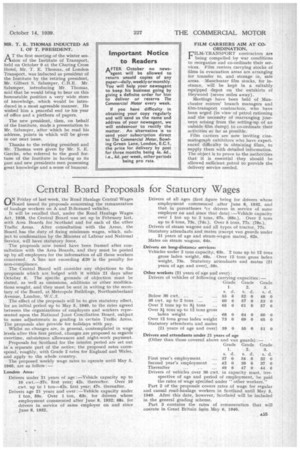Central Board Proposals for Statutory Wages
Page 17

If you've noticed an error in this article please click here to report it so we can fix it.
OrIN Friday of last week, the Road Haulage Central Wages issued its proposals concerning the remuneration of haulage workers on A and B-licensed vehicles.
It will be recalled that, under the Road Haulage Wages Act, 1938, the Central Board was set up in February last, with Area Boards for Scotland and for each of the other Traffic Areas. After consultation with the Areas, the Board has the duty of fixing minimum wages, which, subject to confirmation by the Minister of Labour and National Service, will have statutory force.
The proposals now issued have been framed after consultation with the Area Boards, and they must be posted up by all employers for the information of all those workers concerned. A fine not exceeding is the penalty for non-compliance.
The Central Board will consider any objections to the proposals which are lodged with it within 21 days after October 6. The specific grounds of objection must be stated, as well as omissions, additions or other modifications sought, and they must be sent in writing to the secretary of the Board, at Metropole.Buildings, Northumberland Avenue, London, W.C.2.
The effect of the proposals will be to give statutory effect, for an initial period up to May 5, 1940, to the rates agreed between the organizations of employers and workers represented upon the National Joint Conciliation-Board, subject to• some adjustments in grading in certain Traffic Areas. The proposals also provide for holidays with pay.
Whilst no changes are, in general, contemplated in wage levels after this first period, changes are proposed as regards overtime, subsistence allowances and night-work payment.
Proposals for Scotland for the interim period are set out in a separate part of the notice; the proposed rates correspond, roughly, with Grade 2 rates for England and Wales, and apply to the whole .country.
The proposed weekly wage rates to operate until May 5, 1940, are as follow :— London Area:
Drivers under 21 years of age : —Vehicle capacity up to 10 cwt.-37s, first year; 42s. thereafter. Over 10 cwt, up to I ton-42s. first year; 47s. thereafter. Drivers age 21 years and over : —Vehicle capacity under 1 ton, 59s. Over 1 ton, 63s. for drivers whose employment commenced .after June 8, 1932; 88s. for drivers in service of same employer on and since. June 8, 1932. Drivers of all ages (first figure being for drivers whose employment commenced after June 8, 1932, and that in parentheses .'or drivers in service of same . employer on and since that date) :—Vehicle capacity over 1 ton up to 2 tons, 67s. (68s.). Over 2 tons up to 5 tons, 73s, (74s.). Over 5 tons, 77s. (78s.). Drivers of steam wagons and all types of tractor, 775. • Statutory attendants and mates (except van guards under 21 years of age and steam-wagon mates), 62s. Mates on steam wagons, 648.
Drivers on long-distance services:
. Vehicles under 2 tons capacity, 63s. '2 tons up to 12 tons gross laden weight, 68s. Over 12 tons gross laden weight, 73s. Statutory attendants and mates (21 Drivers of vehicles over 30 cwt, in capacity must, irrespective of age and period of employment, be paid the rates of wage specified under " other workers." Part 2 of the proposals covers rates of wage for regular and casual road-haulage workers in Scotland until May 5, 1940, After this date, however, Scotland will be included in the general grading scheme.
Part 3 contains the rates of remuneration that will onerate in Great Britain fxorn May 6, 1940.




















































